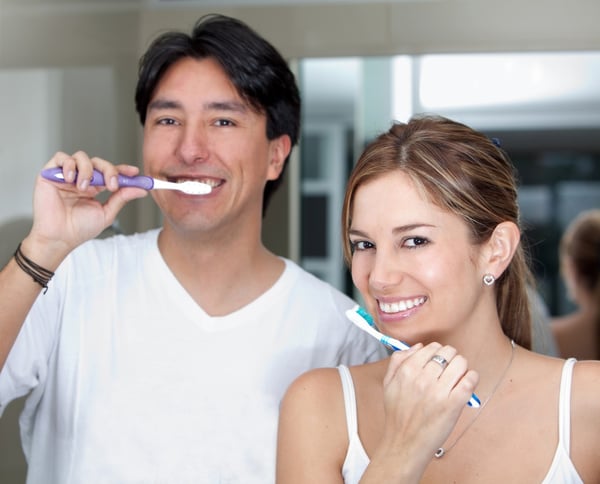
When you think about dental care, do you consider it a luxury or a need?
As you think about that question, consider the following statistics:
- 95 percent of American adults considered their oral health to be “critical to overall health.”
- 85 percent “planned” to visit a dentist twice in the past year for preventive care, but only 40 percent actually did so.
- While 77 percent of Americans now have dental insurance — up from just 64 percent in 2014 — the uninsured rate for dental coverage is four times that of medical coverage.
- Per the NADP, “Individuals without dental benefits are more likely to have extractions and dentures and less likely to have restorative care or receive treatment for gum disease. Furthermore, those without dental benefits report higher incidences of other illness; they are 67 percent more likely to have heart disease, 50 percent more likely to have osteoporosis, and 29 percent more likely to have diabetes.”
- While “uninsured” may create the assumption of “unemployed”, the fact is over ⅓ of Americans who do not have dental insurance are gainfully employed, but either don’t have access to insurance, don’t understand it well enough to participate, or can’t afford the premiums. (And, that includes seniors who are often still working, but relying on Medicare for insurance.)
So, what do you think? Is dental care a luxury? Or is it necessary?
The answer isn’t as simple as you might think. After all, no one is arguing that maintaining good oral health isn’t beneficial. But, at the same time, proper dental care and access to coverage seems to be lower on the priority list.
As a result, many individuals need to make a conscious decision between taking care of their dental care needs or spending their hard-earned money on other things. And, regretfully, other things win out quite often.
But, why does your oral health warrant more attention? Isn’t it good enough to take care of your teeth at home? And, what alternatives are available for those who are uninsured or underinsured for dental care? This article will answer those questions.
The negative health effects of neglecting dental care
The more scientists study the connection between oral health and overall health, the more compelling evidence they find that the two are closely linked.
Dentists have routinely diagnosed all of the following conditions based directly on an examination of the teeth, gums, palate, tongue, and throat, or based on diagnostic efforts related to oral health conditions they were treating:
- Immunodeficiency (including numerous autoimmune disorders like HIV/AIDS, Lupus and ITP)
- Diabetes
- Infections (like endocarditis)
- Osteoporosis (and similar conditions affecting bone density)
- Oral cancer (cancer of the tongue, throat, sinuses, etc.)
- Cardiovascular disease (the #1 killer in the United States)
- High blood pressure
- (Increased risk of) Stroke
- GERD and acid reflux
- Anemia
- Rheumatoid arthritis
- Chronic stress
This list includes many of the most prolific diseases and conditions facing our society today. Can you really afford not to let a dentist examine your teeth regularly?
Of course, most of us are in the habit of brushing our teeth regularly, and sometimes we even floss. Isn’t that good enough, at least until there’s a problem?
Why DIY dental care isn’t sufficient

When you brush your teeth properly — twice a day, for two minutes each time, using a soft-bristled brush and quality toothpaste — you’re removing most of the thin, sticky coating of bacteria, food particles, and acid covering your teeth throughout the day.
Likewise, if you floss properly, the spaces between your teeth, where the toothbrush doesn’t touch, get the same basic cleaning. Rinsing with a quality mouthwash adds another layer of protection (although it’s no substitute for brushing and flossing.)
Let’s get into the chemistry going on in your mouth: The coating that builds up on your teeth is called plaque, and if it stays on your teeth too long, it naturally hardens into tartar, which may as well be cement, and is much harder to remove. But there’s more to the situation than the gross-out factor: since plaque contains bacteria and food, the waste these microorganisms leave behind gets stuck to the surface of your teeth. Those secretions are acidic, which is why poor oral hygiene — essentially, leaving plaque on your teeth for too long — is one of the leading causes of cavities.
So, yes: regularly brushing, flossing, and rinsing is vital to your oral health. But, it’s not sufficient on its own. If your goal is to not only avoid dental problems, but to avoid that terrifying list of other related conditions as well, you’ll need the help of dental professionals.
While you can effectively remove plaque by brushing and flossing well everyday, when tartar forms, you could brush all day long and it likely won’t budge. That’s where the hygienist’s specialized tools come in.
Additionally, both the hygienist and the dentist are trained to perform a thorough visual exam of your mouth and read x-rays of your teeth and jaws. It’s via these examinations that they’re able to diagnose potential health problems, recommend the best treatments possible, and oversee treatment, all of which promotes oral and overall health.
So, we’ve established the importance of maintaining excellent oral health, both through self-care habits and professional intervention. But, what about the high cost of care for those who are uninsured?
The keys to affordable oral health for uninsured employees
As noted above, many of America’s uninsured adults are employees who:
- Have access to dental insurance, but don’t understand how to best use it
- Have access to dental insurance, but can’t afford the premiums and out-of-pocket costs
- Don’t have access to dental insurance through their employers
Let’s cover tips for employees in all these circumstances:
For uninsured employees who don’t understand how to use dental insurance

For employees who have access to dental insurance, but don’t know how to make the best use of it, research is key.
Insurance has always been a complex topic. However, detailed research — with the help of a professional when necessary — is vital if you’re going to understand what options are available and how to take full advantage of them.
Your local Health and Human Resources (HHR) department is a great place to start your investigation. These services are often organized on a county level. Professionals at your local HHR understand health-related benefits offered through the county as well as regional, state, and federal programs under which you and your family may qualify for affordable medical and dental coverage.
Additionally, if there are any available no- or low-cost clinics in the area HHR professionals should be able to direct you to the closest options.
For employees with or without dental insurance who can’t afford the out-of-pocket cost
Free and low-cost health and dental clinics are an excellent option available in most communities. These are usually health clinics that are subsidized by the government or donated funds so low-income individuals and families can receive needed medical and dental care without being hindered by cost. They may be open to the public, or they may be limited by qualifications.
If you qualify, free or low-cost clinics can offer quality medical and dental care at a fraction of the cost of going to a local private office or the emergency room, so they offer a valuable service for uninsured employees.
If you choose to go to a private office instead — either because you don’t qualify for a clinic, or because you want to see a particular dentist — consider the possibility to negotiate the office’s published fees for your services.
Like any commercial business, dentists must compete with other practices in the area for a limited number of patients. That being the case, some may be willing to negotiate with you for reasonable fee reductions if it means gaining or keeping you as a patient.
As part of their marketing program, many offices offer various incentive programs and discount offers to loyal patients. This can also be a basis for negotiation, especially if you’ve been a patient for some time but fall outside the office’s normal requirements to offer a certain perk.
Additionally, a number of established dental discount programs exist that make it possible for patients to save significantly on dental care by choosing providers that participate with the discount plan. The monthly or annual membership fees for these programs are generally low, there are no prerequisites for membership, and they don’t involve restrictions, or limitations inherent to many insurance plans.
For example, the Dental Solutions dental discount plan offers 20-50 percent off the normal retail cost of standard and advanced services at participating dentists across the nation. The entire household can use the discount for just $9.95 per month, and the same program can be upgraded to include numerous health and wellness discounts like prescriptions, vision care, chiropractic, and more with the Wellness Complete program.
Following these tips in conjunction with wise money management will put you in an excellent position to afford quality dental care for you and your family, whether dental insurance is currently available or not.
For employers: Alternatives to traditional dental insurance
Under the Affordable Care Act (ACA), employers are required by law to provide access to a minimal level of health insurance. However, dental insurance for adults is not included in the law’s requirements. That, combined with the high cost of providing insurance coverage for their employees, leaves many employers with few options.
This is often just as upsetting to the employers as it is to employees. After all, employers know that the most productive and engaged workers are those who feel their employer cares for them and has their best interests at heart. An employee who is healthier and happier is less likely to call in sick, less likely to be a “presentee” — present at work but unproductive because they feel sick — and less likely to seek out other jobs as readily.
These employers are increasingly looking for alternative ways to meet their employees’ need for quality dental care by offering an alternative to traditional dental insurance benefits.
One of the most popular options for employers is the same dental discount program described above. While employees can join this type of program on their own, it can also be included as part of an employee benefit package without any added restrictions, complications, or administration fees. A dental discount plan can be a valuable money-saving benefit that helps promote the good oral health of an employee and their household.
As an alternative to dental insurance, it includes convenient features:
- No rejected applications
- No restrictions on usage
- No annual or lifetime maximums
- No high deductibles
- No high copayments
- No complicated billing/reimbursement arrangements
Joining and using a dental discount plan is a simple and straightforward process for employers and employees. The dental discounts can either be:
- Employer sponsored — the employer assumes the cost of the program for the employees.
- Employee opt-in — the employee pays the cost of the program and can choose whether or not to participate.
So, have you considered your answer to the question from the introduction? Is dental care a luxury or a need?
Hopefully you now agree that maintaining excellent oral health is definitely a need. And, if you have access to affordable coverage, it can benefit you to take advantage of it. However, even if you can’t afford traditional dental insurance, there are many ways to still prioritize your oral health and mitigate the high cost of quality dental care.
If you’re interested in exploring the Dental Solutions dental discount program, visit the link below to learn more.

